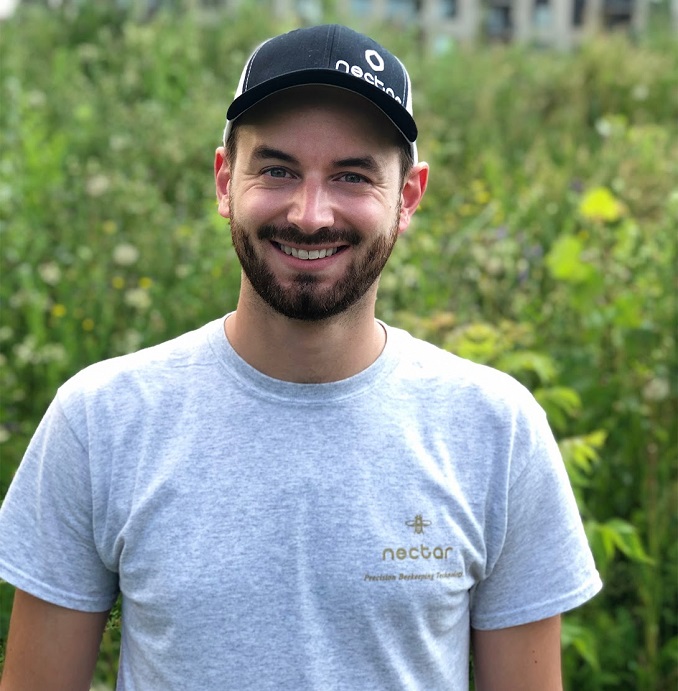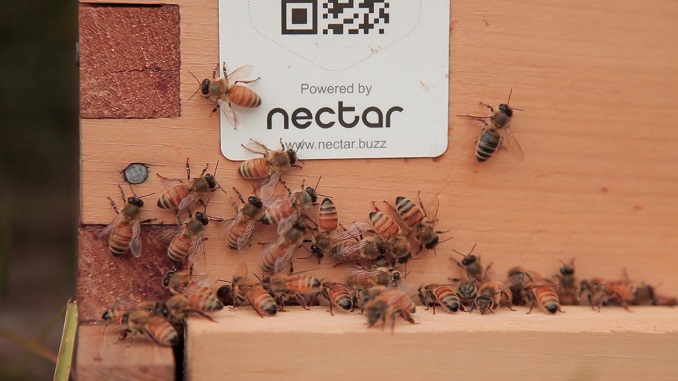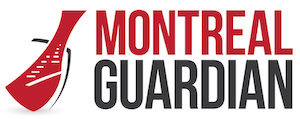Nectar is a startup that has built and launched a technology, called BeeTrack, enabling migratory beekeepers to access data-driven insights needed to establish their operation’s best management practices and improve beehive survival rates. With the help of this technology, they learned that the major cause of pollinator mortality, including honey bees, is conventional agricultural practices, such as intensive pesticide use and monocultures, augmenting the environment’s toxicity while depleting the land of forage diversity. Nectar’s current goal is to incentivize growers to adopt bee-friendly farming practices, such as planting cover crops, establishing conservation areas, and enhancing integrated pest management programs. This systemic change not only helps the managed honey bee but also benefits wild pollinators by creating an environment in which they can thrive year-round, and not only when pollination is needed. This week we had the chance to talk with the Co-founder and CEO of Nectar, Marc-André Roberge, to find out more about them.

What is your business called and what does it do?
Nectar Technologies helps beekeepers raise more productive honey bees to secure our food supply using data and AI.
What made you want to do this work?
Beekeeping itself started out when I was in university. I was studying product design and one of our projects in class was to design a tiny home, like an optimized tiny home for humans. I decided to go against the grain a little bit and do a tiny home for insects. And that’s how I got introduced to the topic of beekeeping. I really got passionate about the interactions between humans and bees and the fact that it’s one of the few insects that we’ve domesticated. It’s probably the only insect in which there’s an actual interaction going on. For example, when a human interacts with the hive, it has an effect on the mood, and the way the bees will act afterward as a superorganism. They’ll have a reaction to the human, so all of that was pretty fascinating.
From a product perspective, I was super interested in the history of how hives were designed. It also touched on my environmental values and understanding of the impact that beekeeping has on the food system and on our food supply chain. A third of the food we grow requires pollination, and about 75% of crops are dependent on insect pollination. Bit by bit I discovered more about urban beekeeping, and then local beekeeping, and then sideliners, then commercial beekeepers moving hives around North America to offer pollination services. Then I learned about the whole spectrum of stakeholders that are involved within that supply chain and I got really passionate about that part. Helping beekeepers and helping the bees themselves can have a significant impact on our food supply chain and on the sustainability aspect of the supply chain.
I was interested in the interactive part between bees and humans, so obviously I started beekeeping myself at some point. You can’t just get interested in bees and not start beekeeping yourself. So I joined a local group of beekeepers that were tending to a dozen hives.
The moment you start opening up hives it’s pretty overwhelming, you kind of tend to forget what you’ve learned. It was many years ago now, but I thought alright, there are a lot of things happening. The moment when I’m in the bees, there has to be a way for my bees to tell me what’s going on without having me try to guess everything. It probably could lead to poor health or even the hive dying if I’m making the wrong decision so I started asking myself the question, how can we translate the language of bees into something that humans can understand so that bees can tell us what’s going on? So as I was thinking of that it pointed me toward technology.
I never thought I would’ve started a technology startup back in the day, but it led me to think about how we can use empirical data, like the impact of location on hive survivorship, to really understand what’s going on at the hive level. I think now Nectar kind of has the same spirit of: can we use data to translate what’s going on within a beekeeping operation and with its surroundings, and interpret that so humans can make better decisions? So that’s how I got interested in the idea, and I launched Nectar, in the beginning, to look at that.
What problem did you want to solve with the business?
The thesis behind the creation of Nectar was to leverage technology in order to help beekeepers raise thriving honey bee colonies. Because honey bees are responsible for pollinating about a third of the food that we grow, improving the stock of honey bee colonies would create a positive impact on the food system. Nectar has built and launched a technology, called BeeTrack, enabling migratory beekeepers to access data-driven insights needed to establish their operation’s best management practices and improve beehive survival rates. For example, our product can help establish which environment visited by the colonies during the season led to higher mortality rates than others.
While this solution is very promising, working with beekeepers and the supply chain’s stakeholders in the past years helped our team gain a deeper understanding of the food system. We learned that the major cause of pollinator mortality, including honey bees, is conventional agricultural practices, such as intensive pesticide use and monocultures, augmenting the environment’s toxicity while depleting the land of forage diversity. Being exposed to such poor environments throughout the season leads the honey bees to become fragile when facing threats such as parasites and diseases.
We then realized that we had to broaden our mission and impact to not only improve the overall stock of managed honey bee colonies, but also the agricultural environment in which they forage. The avenue we’re exploring now is to incentivize growers to adopt bee-friendly farming practices, such as planting cover crops, establishing conservation areas, and enhancing integrated pest management programs. This systemic change not only helps the managed honey bee but also benefits wild pollinators by creating an environment in which they can thrive year-round, and not only when pollination is needed. Everyone wins: the beekeepers benefit from a better environment for their bees, the growers have a more resilient ecosystem supporting better pollinator biodiversity, and the consumers’ food supply chain is secured.
Who are your clientele/demographics?
We work with beekeepers across North America, the majority of whom are migratory pollinators.

How does your business make money? How does it work?
We sell a SaaS product named BeeTrack. BeeTrack is made up of QR/NFC hive tags, a smartphone app, and the Manager’s web portal. When performing an inspection or moving the hives workers can enter information about what they’re doing and what they see. We combine this information with the GPS locations of the hives and we can determine if there are trends. For example we can show a beekeeper which type of queen bees have the highest colony survivorship rate. This way when they’re ordering more queens for next year, the beekeeper knows which type of queens have the best chance of creating healthy hives.
Where in Montreal can we find your profession?
Our office is located in Outremont. We also run a 100-hive beekeeping operation named Ferme Nectar located in Lavaltrie. We’re a hybrid team mostly based out of Montreal, and we’re hiring!
What is the best question a prospective customer could ask a member of your profession when comparing services? Give the answer as well.
Can you tell me which practices and locations have the biggest impact on the survival rate of my hives?
Yes, we can!
What is the best part about what you do? What is the worst part?
The best part is twofold. The first one is being exposed to very interesting people, and people I can learn from. So both from the industry perspective, from the commercial beekeepers that we’ve met, that have multi-generational knowledge about how to best manage honey bees, from the academics that are also trying to bring their own significant changes within the beekeeping industry and try to scale that and use our tech to leverage it. So learning from them and also the stakeholders, so the growers themselves, the organizations, the nonprofits that work in improving the environment itself, the organizations that depend on the food supply chains – they all work together to be able to get the ingredients to consumers. Learning from all the different stakeholders that are all within the food system. It’s been very rewarding from a personal perspective.
The same thing goes for the team that we’ve put together at Nectar. The people that have joined the company and have joined the mission I think we are an interesting bunch. What’s cool is that everyone comes from different backgrounds and it’s a mix of different specialties. We’ve got people from data science, designers, people in marketing, people in software development, farm operations, and beekeeping research. Just having all these different personalities and specialties within the same team has been very rewarding to learn from everyone. So I would say that’s the most exciting part.
As for the worst, I prefer to think of it as the most challenging part. Pollinators are facing a lot of issues, and a large part of that is because the food system is very fragmented. Between the farm and our forks, there are a lot of different players, with varying degrees of commitment toward sustainability, regeneration, and pollinator health. The overall food supply chain needs to change quickly to minimize and, ultimately, suppress its impact on the environment by tackling complex issues like food waste, over-abundant packaging, energy consumption in transformation, slavery, etc.
As you can imagine, it takes a communal effort from all stakeholders involved in the food system to bring solutions to these challenges – in other words, it takes a village. Nectar and its mission to grow a sustainable pollinated food system is only one member of that village. It’s encouraging to see more and more stakeholders recognize the importance of coming together to improve the pollinated food system – everyone from smallholder farmers to legislators, and from global corporations to startups.
What is your favourite joke about your own profession?
The First Law of Beekeeping: For every beekeeping idea, there exists an equal and opposite idea.
The Second Law of Beekeeping: They’re both wrong.
What are your social media channels?
Facebook | Instagram | LinkedIn | Twitter | Website
PAY IT FORWARD: What is another Montreal business that you love?
Our office is located right around the corner from Caffe della Pace. Rivka and Giacomo serve homemade vegetarian food, and it’s a favourite spot for Nectar employees to grab something healthy and delicious when working from the office. It’s a tradition to take new hires there for lunch on their first day!




